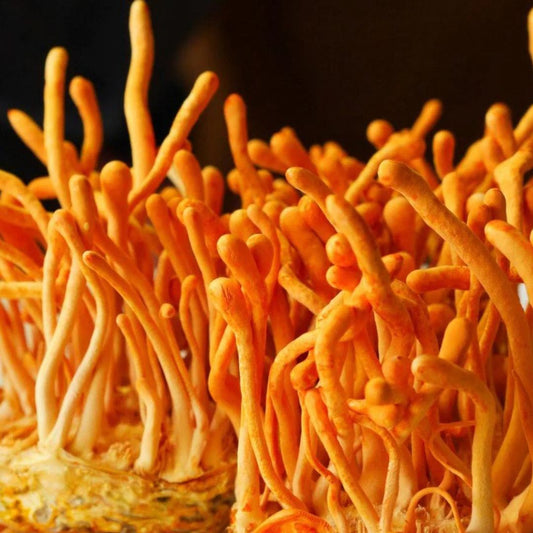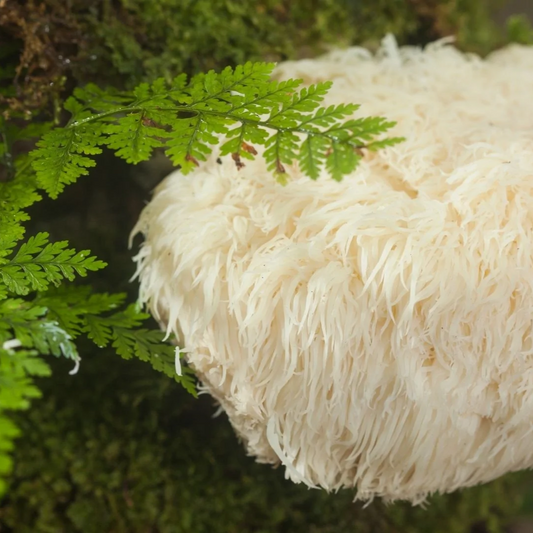A sharper memory is something that many of us strive for. As we age, our memories tend to decline due to the natural ageing process and other factors such as stress, hormonal changes or inadequate nutrition. If, like us, you've been searching for a natural supplement to boost memory and cognitive function, you might have heard about Lion's mane (Hericium erinaceus). This intriguing, nutrient-rich fungus has been used for centuries in Traditional Chinese Medicine to improve brain function. But does it work? Let's take a closer look at the science behind Lion's mane and memory.
What is Lion's Mane?
Lion's mane mushroom is a type of medicinal fungus with an array of potential health benefits. Found mostly in the Northern Hemisphere, it has been used in Traditional Chinese Medicine since ancient times to help people optimise their well-being. Its name comes from its shaggy, white appearance which looks similar to a lion's mane. It is most often consumed as an extract or as a dried powder made from ground mushrooms, and these products can usually be found in health food stores or purchased online. Regardless of how you consume it, Lion's mane mushroom can provide valuable nutrients including essential vitamins and minerals that have the potential to improve many aspects of your well-being and vitality.
Lion's Mane Mushroom Benefits
Scientists have found that the potential wellness benefits of Lion's mane mushroom are thanks to naturally-occurring active compounds of the fungi which help increase the production of nerve growth factor (NGF). The potential benefits of lion's mane include:
- Improved cognitive function
- Increased clarity of mind
- Neuropathic pain relief
- Reduced inflammation
- Immune support
- Improved cholesterol levels
- Better digestive health
- Anxiety and stress relief
- Boosts the mood
- Lowers blood sugar
Does Lion's Mane Help With Memory and is it Good for the Brain?
The active compounds in Lion's mane that are responsible for its myriad of potential health benefits include hericenones and erinacines, which contribute to the increased production of NGF (nerve growth factor). NGF is a protein that plays an important role in the development and survival of neurons. It is believed that by increasing NGF, Lion's mane mushroom can help to support neuron growth and activity, thereby improving cognitive function and memory.
In addition to this potential memory-boosting effect, Lion's mane has also been shown to help protect the brain against age-related damage. This is thanks to the presence of compounds such as hericystin and erinacines which can help to reduce inflammation and remove toxins from the brain.
Does Lion's Mane Mushroom Help with Brain Fog?
Yes, studies have shown that Lion's mane has the potential to improve mental clarity and focus thanks to its antioxidant and anti-inflammatory properties.
Lion's Mane Mushroom Clinical Studies
A 2008 Japanese study looked at the effects of Lion's Mane on cognitive function and memory in elderly adults. Participants were given either lion's mane or a placebo for 16 weeks and at the end of the trial, those who had consumed Lion's mane performed significantly better than those taking the placebo in memory tests.
Further studies have also looked at the effects of lion's mane on Alzheimer's, dementia and other age-related cognitive decline and have found that Lion's mane can help to improve cognition in those suffering from these conditions.
Lion's Mane Mushroom Side Effects
In general, Lion's mane is considered to be safe for most people when consumed in the recommended amounts. However, some people may experience mild digestive side effects such as bloating or nausea. It is therefore important to start with small amounts of Lion's mane and increase gradually if necessary. As with any supplement, it is best to speak to your doctor before taking Lion's mane, especially if you are pregnant or breastfeeding.
Lion's Mane Addiction
Unlike some other substances, Lion's mane is not addictive in any capacity. Whereby drugs and alcohol can trigger a surge of dopamine - an element responsible for addiction - consuming this mushroom doesn't create the same craving or dependence. Not only is it non-psychoactive, but also no withdrawal symptoms have been observed when someone stops taking this mushroom.
Final Thoughts on Lion's Mane for Memory
In conclusion, Lion's mane mushroom is a unique and powerful medicinal fungus which has been used for centuries to improve overall health and vitality. The bioactive compounds in lion's mane have the potential to boost cognitive function and memory, reduce inflammation, support neurological health, and even improve mental clarity and focus. While further research is needed to understand the full potential of Lion's mane, its many purported benefits make it a valuable addition to any health regimen.
FAQ
What is the best mushroom for memory?
Research indicates that the best mushroom for memory is Lion's mane, which has been shown to improve cognitive function and memory. Other mushrooms that are beneficial for brain health include reishi and chaga.
Is Lion's Mane good for the brain?
Yes, Lion's Mane has several potential benefits for the brain. It may help to increase the production of nerve growth factor (NGF), protect against age-related damage, reduce inflammation and remove toxins from the brain. Additionally, some studies have shown that Lion's Mane can improve cognitive function and memory in elderly adults.
What are the side effects of lion's mane mushroom?
In general, Lion's mane is considered to be safe for most people when consumed in the recommended amounts. However, some people may experience mild digestive side effects such as bloating or nausea. It is important to start with small amounts and increase the dose gradually.
Does Lion's mane interact with medications?
Yes, Lion's mane may interact with certain medications. It is important to speak to your doctor before taking Lion's mane if you are currently taking any medication as it may interfere with their effectiveness or cause undesirable side effects. Additionally, Lion's mane should not be taken if you are pregnant or breastfeeding.









